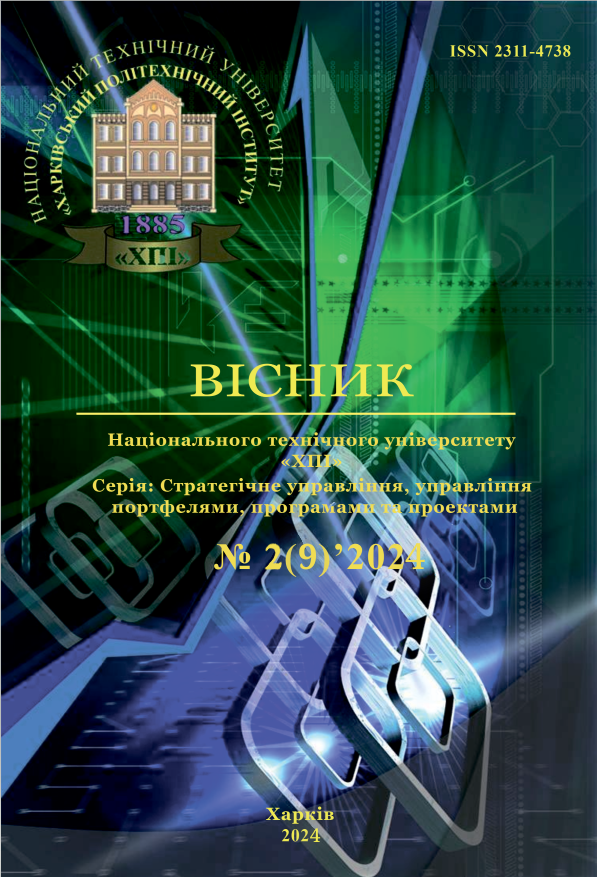A MODEL FOR SELECTING ARTIFICIAL INTELLIGENCE TOOLS TO SUPPORT SOFTWARE DEVELOPMENT PROCESSES
DOI:
https://doi.org/10.20998/2413-3000.2024.9.6Keywords:
artificial intelligence tools, software development processes, software development project, optimization modelAbstract
Integrating artificial intelligence (AI) tools into software development projects significantly improves the efficiency of various tasks within the software development lifecycle (SDLC). AI-driven tools embedded in integrated development environments (IDEs) improve developer productivity and code quality, and facilitate better interaction between project participants and AI-based systems. The main research directions for integrating AI into software development processes include adapting user interfaces for specific tasks, increasing trust in AI-based systems, and improving code readability. AI enhances several SDLC stages, including automated code generation, code review and defect prediction. Implementing AI tools in IDEs accelerates development, improves code quality and reduces defects. Machine learning and natural language processing play a critical role in improving software quality through requirements classification and defect prediction. AI-based solutions, such as recommendation systems and chatbots, support various software development processes, including requirements gathering. Therefore, a relevant scientific and practical challenge is to create a model for the justified selection of AI tools to support software development processes in order to improve project efficiency. This study proposes a mathematical model that minimizes the cost of using AI tools, while ensuring compliance with minimum requirements that affect project efficiency. The optimization model takes into account criteria such as pricing, integration, support and functionality capabilities, using normalized evaluations based on Gartner Peer Insights and other open sources. The objective function minimizes the total cost of AI tools, subject to constraints that ensure minimum acceptable evaluation scores. The developed approach enables a systematic selection of AI tools, thus improving the efficiency of software development projects.
References
Sergeyuk A., Titov S., Izadi M. In-IDE Human-AI Experience in the Era of Large Language Models; A Literature Review. Arxiv.org, 2024. Available at : https://www.doi.org/10.48550/arxiv.2401.10739. (accessed 10.12.2024).
Goel P. K., Komal K., Vashishth N. AI-Driven Software Development Lifecycle Optimization. Advancing Software Engineering Through AI, Federated Learning, and Large Language Models, 2024. Available at : https://www.doi.org/10.4018/979-8-3693-3502-4.ch005. (accessed 10.12.2024).
Durrani U. K., Akpinar M., Adak M. F., Kabakus A. T., Öztürk M. M., Saleh M. A Decade of Progress: A Systematic Literature Review on the Integration of AI in Software Engineering Phases and Activities (2013-2023). IEEE Access, 2024. Available at : https://www.doi.org/10.1109/access.2024.3488904. (accessed 11.12.2024).
Del Carpio A. F., Angarita L. B. Assistant Solutions in Software Engineering: A Systematic Literature Review. IEEE Xplore, 2023. Available at : https://www.doi.org/10.1109/icsess58500.2023.10293029. (accessed 12.12.2024).
Ng K. K., Fauzi L., Leow L., Ng J. Harnessing the Potential of Gen-AI Coding Assistants in Public Sector Software Development. Arxiv.org, 2024. Available at : https://www.doi.org/10.48550/arxiv.2409.17434. (accessed 12.12.2024).
Lumbanraja H. L., Raharjo T., Fitriani A. N. Artificial Intelligence Implementation in Agile Project Management Addressing Challenges and Maximizing Impact. The Indonesian Journal of Computer Science, Vol. 3, No. 4, 2024. Available at : https://www.doi.org/10.33022/ijcs.v13i4.4155. (accessed 12.12.2024).
Modi M. D. B. Transforming Software Development Through Generative AI : A Systematic Analysis of Automated Development Practices. International Journal of Scientific Research in Computer Science, Engineering and Information Technology, Vol. 10, No. 6. Available at : https://www.doi.org/10.32628/cseit24106197. (accessed 14.12.2024).
Hossain M. Z., Hasan L., Dewan M. A., Monira N. A. The impact of artificial intelligence on project management efficiency. International Journal of Management Information Systems and Data Science, Vol. 1, No. 05, 2024. Available at : https://www.doi.org/10.62304/ijmisds.v1i05.211. (accessed 15.12.2024).
Sravanthi J., Sobti R., Semwal A., Shravan M., Al-Hilali A. A., Alazzam M. B. AI-Assisted Resource Allocation in Project Management. IEEE Xplore, 2023. Available at : https://www.doi.org/10.1109/icacite57410.2023.10182760. (accessed 15.12.2024).
Narasimha M. M. Literature Review AI-Powered Agile: Reimagining Software Development through Automation, XAI, and Continuous Learning. International Journal of All Research Education and Scientific Methods, Vol. 11, No. 12, 2023. Available at : https://www.doi.org/10.56025/ijaresm.2023.1112231949. (accessed 15.12.2024).
Meziane F., Vadera S. Artificial Intelligence in Software Engineering: Current Developments and Future Prospects. Machine Learning: Concepts, Methodologies, Tools and Applications, 2012. Available at : https://www.doi.org/10.4018/978-1-60960-818-7.CH504. (accessed 15.12.2024).
Palacios-González E., Fernández-Fernández H., García-Díaz V., García-Bustelo B. C. P., Lovelle J. M. C. A review of Intelligent Software Development Tools. Proceedings of the 2008 International Conference on Artificial Intelligence, 2008. Available at : https://dblp.uni-trier.de/db/conf/icai/icai2008.html#Palacios-GonzalezFGGL08. (accessed 16.12.2024).
Bahi A., Gharib J., Gahi Y. Integrating Generative AI for Advancing Agile Software Development and Mitigating Project Management Challenges. International Journal of Advanced Computer Science and Applications, Vol. 15, No. 3, 2024. Available at : https://www.doi.org/10.14569/ijacsa.2024.0150306. (accessed 16.12.2024).
Sorte B. W., Joshi P. P., Jagtap V. Use of Artificial Intelligence in Software Development Life Cycle: A state of the Art Review. International Journal of Advanced Engineering and Global Technology, Vol. 03, No. 03, 2015. Available at : https://www.researchgate.net/profile/Vandana_Jagtap/publication/274247843_Use_of_Artificial_Intelligence_in_Software_Development_Life_Cycle_A_state_of_the_Art_Review/links/551925a20cf273292e70a6da.pdf. (accessed 17.12.2024).
Gartner Peer Insights. Available at : https://www.gartner.com/peer-insights/home. (accessed 17.12.2024).
Patro S. G. P., Sahu K. K. Normalization: A Preprocessing Stage. International Advanced Research Journal in Science, Engineering and Technology, Vol. 2, No. 3, 2015. Available at : http://dx.doi.org/10.17148/IARJSET.2015.2305. (accessed 17.12.2024).
Downloads
Published
Issue
Section
License

This work is licensed under a Creative Commons Attribution-NonCommercial-ShareAlike 4.0 International License.
Our journal abides by the Creative Commons copyright rights and permissions for open access journals.
Authors who publish with this journal agree to the following terms:
Authors hold the copyright without restrictions and grant the journal right of first publication with the work simultaneously licensed under a Creative Commons Attribution-NonCommercial-ShareAlike 4.0 International License (CC BY-NC-SA 4.0) that allows others to share the work with an acknowledgement of the work's authorship and initial publication in this journal.
Authors are able to enter into separate, additional contractual arrangements for the non-commercial and non-exclusive distribution of the journal's published version of the work (e.g., post it to an institutional repository or publish it in a book), with an acknowledgement of its initial publication in this journal.
Authors are permitted and encouraged to post their published work online (e.g., in institutional repositories or on their website) as it can lead to productive exchanges, as well as earlier and greater citation of published work.

